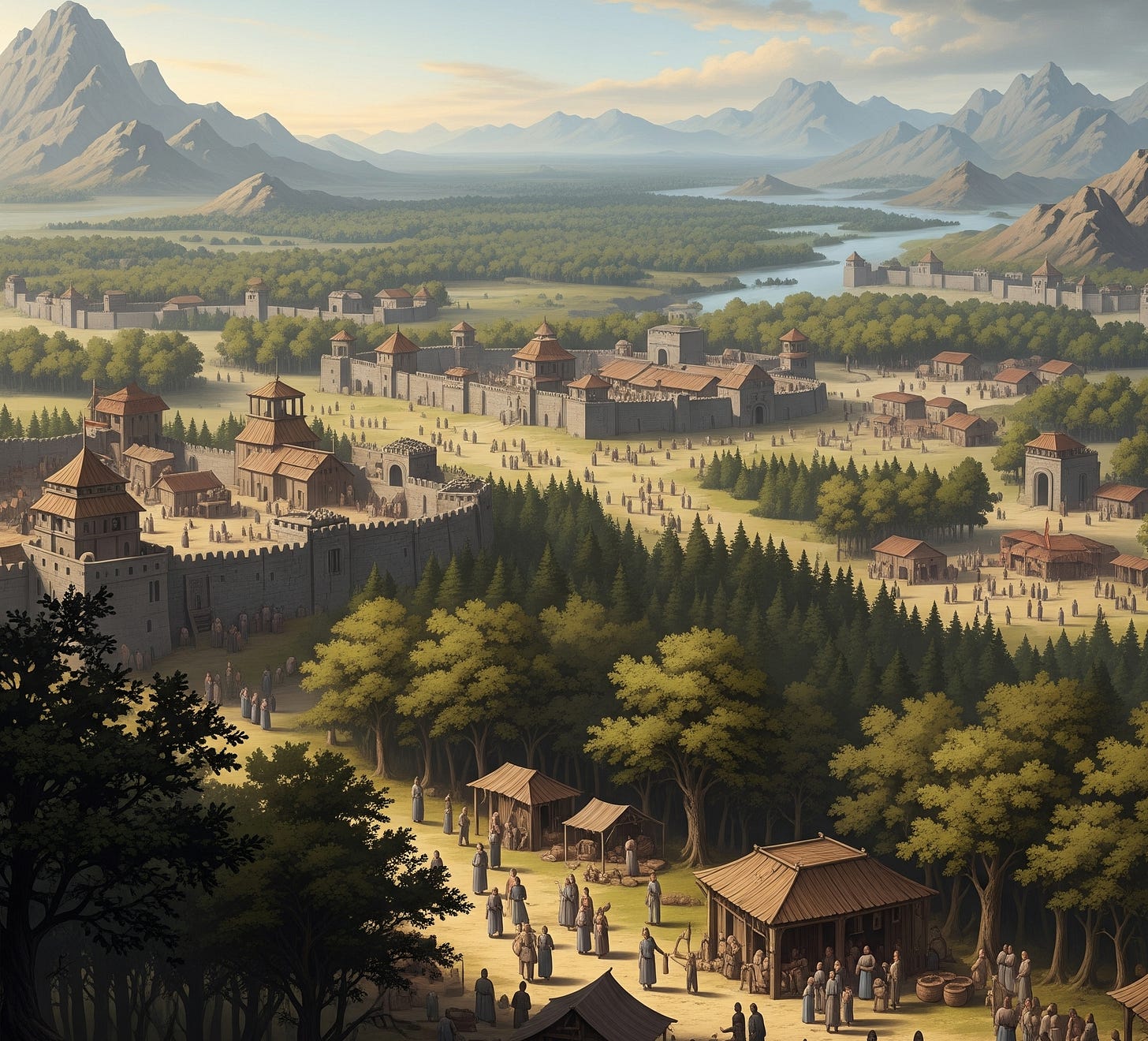The Woke Right is Right - Reclaiming ‘Identity’ in Western Politics
Identity is not the sole property of a particular movement or ideology. To cede its significance is to surrender the future.
The political Right in the West is adrift, shackled to an impotent playbook of free-market dogma, interventionist foreign policy, and vague notion of “democracy” at a time when it has no answer to the Left’s relentless cultural advance. For decades, the Left has weaponized identity politics, reshaping the West’s cultural landscape by amplifying the grievances (real or imagined) of select groups while dismantling the foundations of its Christian and European heritage. And what has been the “conservative” Right’s response? Limp appeals to individualism, meritocracy, and economic tinkering that fail to rally or resonate with its core constituents.
What emerged in the post-World War II haze of liberal compromise is this go-along-to-get-along approach, which betrays the very people it claims to represent: those who embody the West’s cultural, spiritual, historical, and ethnological core. Thus, a new force, smeared as the “woke right” by its critics, has risen to challenge this insidious status quo. This evolving force on the Right isn’t a betrayal of conservatism—it’s a defiant affirmation and reclamation of the primal truth: politics has always been, and will always be, about identity.
The Iron Law of Identity
The Right’s failure in the 20th century is not accidental, it’s the fruit of a deliberate pivot after World War II, when conservative leaders embraced a sanitized, non-confrontational ideology aligned with globalist liberalism. The deliberate watering-down of traditionalism, nativism and ethnocentrism and replacing it with anti-communism, prioritizing global markets and elite governance over safeguarding a nation’s cultural roots was the result.
This neutered conservatism sidelined the West’s defining elements: its Christian faith, European heritage, and communal solidarity, as well as the accomplishments of its great men. Reducing their accomplishment and legacy to historical footnotes in a sterile debate about tax cuts and trade deals.
Enter the “woke right,” a movement that rejects modern conservatism’s spineless agenda. Far from mimicking the Left’s identity politics, it seeks to restore the West’s cultural bedrock—its faith, heritage, and masculine vigor—as the basis for political action. And in order to do so, it has revived the quest for identity in the West.
Critics like James Lindsay and Jordan Peterson, who have built their brands railing against progressive “wokeness,” call this a contradiction, insisting conservatism should cling to policy-driven individualism. They’re wrong. The charge of “wokeness”, besides being incorrect, is a deliberate misdirection. The Left’s identity politics seeks to fracture; the Right’s re-embrace of identity aims to rebuild. While the Left elevates select groups to undermine the West’s foundations, the Right’s new vanguard champions the majority’s heritage to restore cohesion and, in time, greatness.
The Left’s identity politics, in addition to its divisiveness, upon deeper scrutiny, is a calculated strategy to erode the West’s cultural cohesion. By championing the concerns of minorities, homosexuals, women (sexless feminists), and immigrants while vilifying the West’s historic majority, notably White, masculine, heterosexual men, the Left has rewritten the cultural narrative, casting the builders of Western civilization as its oppressors.
Meanwhile, the mainstream conservatism, beaten into submission and governed by the fear of being labeled “divisive,” offers meek platitudes about “economic freedom” and “Western” values. This cowardice has left its core constituency—White, Christian, heterosexual men—politically orphaned, their concerns dismissed as “privileged” or “tribalistic.”
Men in the West are failing. To provide some numbers: in the U.S., male workforce participation has dropped from 87% in 1950 to 68% in 2023, suicide rates among White men are triple those of women, and marriage rates have plummeted 60% since 1970. If you think about it, these issues aren’t consequences of abstract policy failures—they’re signs of a steady, unchecked erosion of the status of Western men, an erosion the Right has continually failed to confront, or covertly enabled.
People as James Lindsay, Jordan Peterson, and Konstantin Kisin, known for their opposition to the Left’s identity politics, dismiss the rise of identity politics (i.e. woke right) as a contradiction. They argue that "wokeness," in any guise, clashes with conservatism’s (or is it liberalism?) basis in policy, merit, and individualism. This critique, while appealing to those tired of cultural division, misreads both history and human nature.
No political movement—anywhere, at any time—has ever taken root, flourished, or endured without a shared identity at its core. A nation’s essence is forged in the fires of language, culture, faith, and lineage. These threads weave a collective identity that sets one people apart from another, fostering unity and purpose. This shared identity fuels the drive toward common goals, meeting both personal and societal needs.
History bears this out: from the European states born of the Treaty of Westphalia to the Islamic caliphates of the Middle East, from the Mesoamerican empires to China’s warring states and imperial Japan, to today’s modern nation-states. Each has been defined by a unifying language, culture, religion and heritage. Identity-based politics is not an aberration—it’s the foundation of every enduring polity.
Yet, in the 21st century, a strange double standard has taken hold. Western nations—those rooted in Christian and ethnic European traditions—are discouraged from embracing their own identity and its political outworking. At the same time, they are pressed to champion the identitarian concerns of non-Western, non-Christian, non-European groups within their borders. This asymmetry is no coincidence; it's the endgame of an ideological agenda.
The Trojan Horse of the "Anti-Woke" Right
The "woke right" is a misnomer. A deliberate mislabeling that obscures its true purpose. Unlike the Left’s deconstructive identity politics, which seeks to unravel the West’s spiritually Christian, ethnically European foundations, this emerging Right is reconstructive—a much-needed defense and reclamation of a neglected heritage.
Mainstream conservatism has long countered the Left’s cultural advance with a sterile, “principle-driven” stance: identity politics divides, statism erodes liberty, and unsecured borders dissolve nations. While these arguments carry weight in theory, they have failed to rally a robust defense against the Left’s agenda. The core reality is that politics is inseparable from identity. The question of who we are in relation to our collective place in the world shapes governance, representation, and societal direction.
Since World War II, “the Right” (or what it has degenerated into) has embraced a hollow, non-ideological worldview: fixating on economics, governance, and self-defeating foreign policy adventures while sidelining the cultural, spiritual, and ethnological elements that define a polity’s soul. This stance essentially boils down to a rejection of its own European and Christian base. One that has led to a deliberate marginalization of those who don’t fit its “inclusive,” non-confrontational mold. The main casualties of this self-destructive path: White, heterosexual, Christian men.
Progressive initiatives—cloaked in rhetoric of “anti-racism,” “gender equality,” or “immigrant compassion”—systematically undermine these so-called “privileged” groups. Yet, these are the very groups who built the civilization now coveted and exploited by those who decry it as oppressive.
This point needs to be reiterated. The liberal establishment, uniting the mainstream Left and Right, champions the concerns of minorities, women, homosexuals, and even illegal immigrants, packaging these efforts as universal goods. In truth, they erode the standing of the West’s core demographic, thus undermining the status and role of the very builders of Western society.
Buckley's Folly: The Architects of a Defanged Right
The Right/conservatism’s ideological weakness stems from a deliberate design, going back decades. It was orchestrated by figures like William F. Buckley Jr., founder of the neocon National Review. Celebrated as a bulwark against liberal overreach and communism, upon deeper scrutiny, Buckley’s legacy is far more troubling. He helped craft a conservative movement that necessarily betrayed its own ethnocultural roots.
Buckley’s “fusionism”—a supposed blend of traditionalism, libertarianism, and anti-communism—formed the foundation of what has become modern conservatism. Yet this was no Right in a Right-wing sense of the word. Rather, it was a pragmatic coalition that diluted its cultural potency while adopting liberal traits.
Buckley’s conservatism, despite its apparent accommodation, broadly rejected traditionalism and cultural nationalism, which honored rooted communities, historical institutions, and collective solidarity. These were stripped of their vigor in favor of a pragmatic individualism, which became one of the main precursors to globalism. This “inclusive” framework, dominant after World War II, paved the way for neoliberalism’s push for global markets, supranational bodies like the United Nations, and a universalist democratic capitalism (corporatism in practice) that favored international integration over local sovereignty and cultural preservation.
Conservatism’s pro-capitalist rhetoric, in fact, was a frail counterpoint to a fading communist threat. This helped distract from (or is aimed to distract men from) internal challenges critical to Western nation-states, particularly those with a Christian and European heritage. This problem is evident in the “woke right” promoter James Lindsay: a self-described anti-communist who is fighting an imaginary enemy and wants others to join in his aimless agitation.
Returning to William Buckley, whose embrace of former liberals like Irving Kristol and Norman Podhoretz, carrying their leftist baggage, further muddied the waters, prioritizing foreign agendas over domestic cultural concerns. Buckley’s legacy is a defanged conservatism, cloaked in anti-communist, anti-Islamic (via neoconservativism), and now “anti-woke” rhetoric. All of this fails to address the core issue plaguing the West: the refusal of elected leaders to represent the beliefs and aspirations of the natives: The White, Christian, Western citizens who draw from the heritage of Athens and Rome.
So today’s “woke right” debate, led by clowns like James Lindsay and Konstantin Kisin, echoes Buckley’s gatekeeping, crafting a conservatism that is palatable to secular, liberal elites rather than its true base. Lindsay, in an aping of Buckley, dismisses cultural nationalism, while Kisin and Jordan Peterson cling to individualist, Enlightenment ideals that clash with the unifying identity politics of the emergent Right.
Peterson’s cautions against “tribalism” and Lindsay’s rejection of collective sovereignty alienate those who are Christian, European, and with heteronormative sensibilities, undermining their ability to foster cohesion within their ranks, leading to political isolation.
In sum, these “anti-woke” critics recoil at a true Right that prioritizes Christian, European, and nationalist identity over universalist principles—principles disproportionately pressed upon Western, Christian, and European peoples alone. By branding legitimate identitarian concerns as “woke,” figures like James Lindsay undermine the aspirations of Western men, redefining conservatism in ways that disempower its core demographic.
Worse, these critics often dismiss the genuine struggles of Western men, revealing a contempt that betrays their loyalty not to societal vitality but to a rootless cosmopolitanism that is knowingly or otherwise intent on eroding place in the world.
The Imperative Call for Masculine Revival
The connection between the promoters of “woke right” smear and their deep-seated unease with the emergence of identitarian concerns on the Right correlates with their cynical opposition to the collective welfare and advancement of men in the West. Konstantin Kisin’s remarks on the Chris Williamson podcast expose a troubling perspective. In his words:
“Victimhood doesn’t work for men as it does for women… Biologically, men are disposable… The solution to men’s problems is for men to be better”.
This view, echoed across the Left and the globalist “Right”, betrays not just a disregard for men but a fear of what a political movement centered on their concerns might unleash. The single-minded focus on women, minorities, LGBTQ+ groups, and immigrants is no accident. It’s a calculated effort to suffocate any narrative or movement that may champion the rights of White, Western, Christian, heterosexual men and their political outworking.
The marginalization of Men’s Matters stems from multiple sources. One of which is the personal character and social outlook of the main architects of post-WWII American conservatism. It is worth noting that, in addition to William Buckley’s non-ideological conservatism, many of the dominant figures who shaped American conservatism, the likes of Marvin Liebman, Terry Dolan, Arthur Finkelstein, Roy Cohn, and Bob Bauman, were all homosexuals. Even William F. Buckley Jr.’s eccentricities sparked speculation regarding his sexuality.
This observation isn’t to judge these people but to highlight a tension: the post-war conservative movement, meant to uphold traditional values, was shaped by individuals whose personal lives often clashed with those values. While gay men can be patriots, their influence complicates the narrative of a movement supposedly rooted in cultural tradition, revealing tensions between public ideology and private realities.
Western civilization demands a bold, confrontational masculinity. One that is heteronormative by necessity, if it is to survive. Biological and evolutionary dead ends cannot sustain it. Yet, opponents within the Right, acting as ideological gatekeepers, resist this masculine revival. Jordan Peterson, once a voice for men’s struggles, has softened his edge. Likely dulled by lucrative media deals, now, his message is mainly about propping up the liberal consensus that birthed the radical Left he once critiqued.
Kisin’s blunt dismissal of men’s grievances might be rooted in a subtle hatred of Western men, but more so, it underscores a certain fear of Western men uniting as a political force. Such a movement could upend the post-WWII liberal social order: the ruling class, spanning the Left and a co-opted, spineless Right, benefits from this male-excluding status quo, and so will fight to preserve it.
The Answer: Nationalism
Western men, rise. Characters like James Lindsay, Jordan Peterson, and Konstantin Kisin, with their “woke right” slurs, are not your champions—they are obstacles to a fierce, culturally anchored and creatively disruptive Right. This nationalist Right, rooted in Christian faith, national pride, and masculine strength, speaks to the heart of Straight, White, Western men who yearn for the connection to their blood-and-soil. In other words, if you wish for a political home that is unapologetically Christian, nationalist, and identity-driven in a way that respects who you really are, ignore these fomenters.
James Lindsay’s “woke right” label is an ugly ploy to equate Western nationalism with the Left’s collectivist mire. It’s a divisive tactic meant to leash the Right, stifling the political potential Western men could drive from it. These intellectual charlatans, wedded to so-called “Enlightenment ideals”, are wary of losing their hold over the narrative that guides Western culture, hence oppose the emergence of raw power wielders on the Right who are faithful to their nation, culture, faith and heritage.
The non-ideological conservatism combined with hawkish foreign policy + elite governance has gutted the Right’s cultural, historical, and spiritual core, reducing it to spineless opportunism that merely tinkers with liberal policies. The Republican Party’s failure to stem illegal immigration and reduce the national debt over many administrations is proof of this weakness, or is it policy?
Thus, the “woke right”, which is better termed as the Nationalist Right, is an emerging force that seeks to forge a conservatism that blends traditionalist roots with a forward-looking vision. Nationalism, with its intellectual depth, ideological weight, and cultural strength, is the force to dismantle the liberal order. This order, hostile to men, traditional families, Christian communities, heteronormativity, nationhood, and European identity, is the true enemy of the West. Against it, nationalism is the resolute answer.







